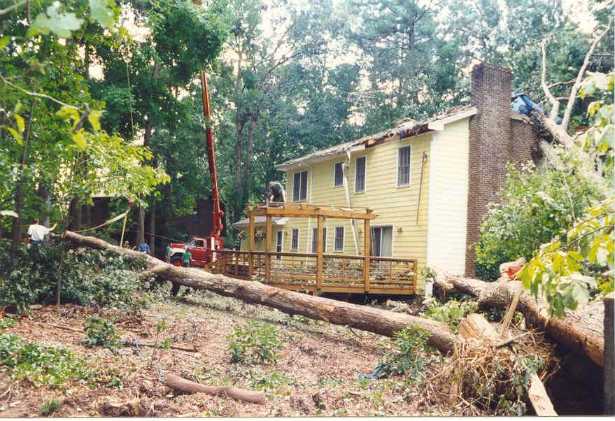
 |
||
| Past Events | ||
MID-ATLANTIC REGIONAL CONFERENCE ON THE INLAND EFFECTS OF TROPICAL WEATHER SYSTEMS, May 11-13, 2003, Raleigh, NC
American Meteorological Society, Cary, North Carolina (schiermeier@msn.com)
The southeastern segment of the United States is highly vulnerable to inland damage caused by incursions of tropical weather systems from the western Atlantic Ocean and the Gulf of Mexico. Two major examples of significant inland destruction in the Carolinas were the personal injuries and extensive property damages caused by the devastating winds accompanying Hurricane Fran (1996) and the extensive flooding produced by Hurricane Floyd (1999). To mitigate the effects of such occurrences, we became convinced that there must be more effective ways to warn local communities of such impending disasters, as well as to improve the emergency response to such incidents through better forecast-response coordination.
Therefore, the Central North Carolina Chapter of the AMS, along with the National Weather Service, the American Meteorological Society (AMS), the National Weather Association, and the State Climate Office of North Carolina hosted the Mid-Atlantic Regional Conference on the Inland Effects of Tropical Weather Systems. The goal of the conference was to bring together members of the research, operational, and broadcast meteorological communities, along with emergency response managers, the news media, and other forecast users to discuss the impacts of tropical cyclones and their dissipating remains in the region from Georgia through South and North Carolina to Virginia. These conference participants were specifically selected in our attempt to improve and coordinate local forecasting and emergency response to such incidents.
The conference was held during May 2003 at the Holiday Inn Brownstone Hotel in Raleigh, North Carolina. In an effort to attract as many attendees as possible, registration costs for the conference were kept low. Over 120 people attended the conference, which featured 42 speakers from across the operational, academic, research, and user communities. The conference began on Sunday night with a reception and a presentation by Dr. Steve Lyons of The Weather Channel on tropical cyclones and how The Weather Channel passes information to the public.
Monday Technical Sessions
On Monday, presentations focused on recent scientific research and advancements in monitoring and forecasting inland impacts of tropical cyclones and their remnants, namely inland flooding, high surface winds, and lightning. Presentations were also made on quantitative precipitation forecasting, mesoscale processes, satellite and radar tracking, and extra-tropical transitioning.
The session opened with remarks from Dr. Elbert (Joe) Friday, President of the American Meteorological Society. Other speakers represented the Canadian Hurricane Centre; the United States National Hurricane Center, National Weather Service, National Aeronautics and Space Administration, National Centers for Environmental Prediction, and Naval Research Laboratory; North Carolina State Climatology Office; and several Universities.
Tuesday Technical Sessions
The focus of Tuesday’s sessions was on educating emergency response managers and other users of meteorological information concerning the inland effects of tropical weather systems and how to deal with their societal and property impacts. Presentations concentrated on improving the effectiveness of inland watches and warnings and how to use the information for personal safety and property protection.
The session opened with remarks from J. Kevin Lavin, Executive Director of the National Weather Association. Other speakers represented the Federal Emergency Management Agency, National Weather Service, National Environmental Satellite, Data, and Information Service, Hydrometeorological Prediction Center, and Southeast River Forecast Center; North Carolina Emergency Management and State Highway Patrol; and several Universities.
Summary
Overall, many significant issues and problems, as well as relevant research relating to the inland effects of tropical weather systems were presented and discussed. Those presentations provided by the speakers have been made available on the conference webpage, located at http://www.nc-climate.ncsu.edu/ams/conference/agenda/. In addition, all registered attendees will receive a CD-ROM containing the presentations. Attendees were surveyed for their impressions of the conference. The survey results will be provided to the American Meteorological Society and to any other local AMS Chapters that plan to sponsor future regional conferences such as this.
Please note that the preceding narrative is a condensed version of the conference activities. The official (and more detailed) conference summary has been submitted for future publication in the Bulletin of the American Meteorological Society.

Removal of trees from the author’s house (200 km inland) after it was hit by Hurricane Fran on September 6, 1996."
 |
||
| Past Events | ||